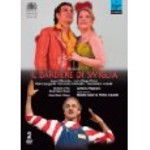This performance, recorded in July, 2009 at Covent Garden, has become known as the Barbiere in which Joyce DiDonato sang from a wheelchair, having broken her leg on stage a few nights before (and continued singing with a walking stick). Let’s just get over that–it’s quite a feat, she’s quite a trouper, you’d never know she was in any discomfort, after a while you hardly notice–and let’s concentrate on the performance itself. If she weren’t in a wheelchair, would it be as interesting?
Indeed, yes. It’s a great performance. Just for the record, there are a half-dozen good Barbieres on DVD, at least one each with DiDonato and Florez (and one with a young Bartoli), but this one is the best. (DiDonato’s other one features a weak tenor; Florez’s has the wimpy-but-some-find-her-charming-but-not-I Maria Bayo; Bartoli’s catches her very young and she’s a delight, but the production is too old-fashioned and Almaviva’s last-act aria is cut.)
The minimalist sets by Christian Fenouillat are fun. The first scene features a big, mostly bare tree set against a huge slice of moon with Rosina’s door and balcony on the right; for the rest of the opera we’re in a striped room with secret doors, sliding doors, and windows that pop open to allow entrances, exits, duets, spying, etc, with little other than an armchair (and harpsichord) for props. The colorful costumes are by Agostino Cavalca, with Figaro wearing a striped shirt that looks like a barber’s pole.
I’m not enamored of the fact that Berta and the policemen all wear funny, pasted on, big noses–what for? Moshe Leiser and Patrice Caurier staged the opera and play for occasionally exaggerated humor. I wonder at the need for having the entire set wobble for the first-act finale: luckily, DiDonato stays on a level slightly lower than the regular playing area, in her wheelchair, pink cast on her leg, away from it all. But otherwise the singers act naturally and seem like real, if comic characters.
But of course, it’s all about the music–and not to get too crazy about it, this very likely is the strongest Barber cast I’ve ever seen. DiDonato, wheelchair or not, is a dream Rosina, vocally flawless and always in good taste (with embellishments that are all her own), emphasizing words and feelings that others miss, reacting to those around her as if the plot were actually happening in real time. And the sound is creamy and luscious from top to bottom, with a trill to die for.
She’s matched note-for-note by Florez, who, rather than resting on his charm, looks, and considerable vocal laurels–brilliant, rapid coloratura, high Cs that sound easy, a messa di voce for the ages–also finds nuances in the text that most tenors simply don’t think about. His true anger at Bartolo in the recit before his huge second-act aria is quite fearful–and beautifully directed, I might add. In the Lesson Scene, Rosina actually seems to be “learning”; it’s terrific interplay.
Pietro Spagnoli’s Figaro is so easily sung and acted that he seems born to the role; in fact, he was a last-minute replacement for Simon Keenlyside and made his Covent Garden debut a few days before this was recorded. He handles the role’s few moments of coloratura well, partners Florez and DiDonato superbly in their duets (“Dunque io son” is a real gem in this performance), and never resorts to mugging or exaggerated delivery. And his comic timing is perfect. Alessandro Corbelli’s Bartolo is as cleanly sung as any I’ve come across–he gets each word and each note just right in his aria and holds up his end of each of his ensembles. And he doesn’t wear out his welcome as most Bartolos do.
Playing against Corbelli’s lack of extravagant acting is Ferruccio Furlanetto’s manic, almost-oversung Basilio, larger than life and very funny. Jennifer Rhys-Davies’ Berta–silly nose, bustle, and all–is humorous and well sung, and Changhan Lim’s Fiorello makes you want to hear more from him.
To say that Antonio Pappano is probably the most reliable conductor in opera today may seem like a left-handed compliment but it is not. There seems to be no genre that makes him uncomfortable, and he gets Rossini’s humor, audacity, charm, and wickedness in spades. The Covent Garden forces actually sound as if they’re having fun playing and singing, and the audience, by American standards normally very reticent, goes wild more than once.
Picture and sound are superb, and direction for the screen by David Stevens is natural, even given the fact that one character is in a wheelchair a level below the other singers. Bonus material includes Pappano’s enlightening discussion of his career and of Barber; the director going on too long about his concept; DiDonato discussing the wisdom of having the cast read the text of the work as part of the rehearsal schedule (and more); and Florez explaining, among other things, just why the final aria is so difficult. Subtitles are offered in all major European languages, and a four-page pamphlet gives only credits and pictures of the production. This is it, if you’re looking for a Barber to watch. [4/9/2010]
































